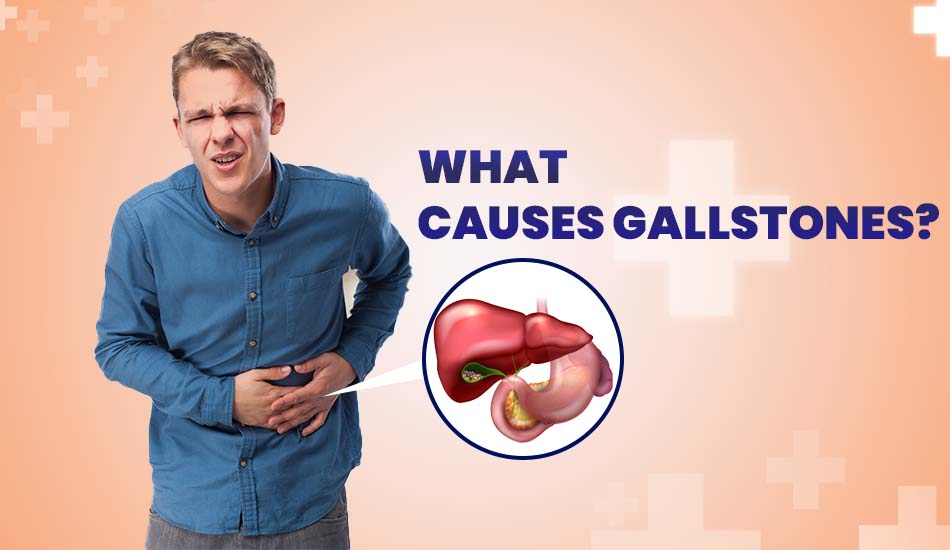
What Causes Gallstones? Key Factors You Should Know
Thursday, 23rd May 2024Gallstones are hardened deposits that can form in the gallbladder, leading to pain and other serious health issues. Understanding the causes of gallstones can help in prevention and management. This article explores the key factors that contribute to the formation of gallstones, providing valuable insights for maintaining a healthy gallbladder.
What Are Gallstones?
Gallstones are solid particles that form in the gallbladder, a small organ under the liver that stores bile, a digestive fluid. Gallstones can vary in size from a grain of sand to a golf ball and may consist of cholesterol, bilirubin, or a mixture of both.
Types of Gallstones
Cholesterol Gallstones
Cholesterol gallstones are the most common type, accounting for about 80% of gallstones. They form when there is too much cholesterol in the bile, which then crystallizes and forms stones.
Pigment Gallstones
Pigment gallstones are smaller and darker, made up of bilirubin, a substance produced from the breakdown of red blood cells. These stones are less common but can occur in certain medical conditions.
Key Factors That Cause Gallstones
Excess Cholesterol in Bile
When the liver produces more cholesterol than bile can dissolve, the excess cholesterol can crystallize and form stones. This is the most common cause of cholesterol gallstones.
Excess Bilirubin in Bile
Certain medical conditions, such as liver cirrhosis, biliary tract infections, and some blood disorders, can cause the liver to produce too much bilirubin. Excess bilirubin can contribute to the formation of pigment gallstones.
Gallbladder Dysfunction
If the gallbladder doesn't empty completely or frequently enough, bile can become concentrated and form stones. Gallbladder dysfunction can result from various factors, including reduced motility (movement) and hormonal imbalances.
Obesity
Obesity is a significant risk factor for gallstones. Excess body weight increases cholesterol levels in the bile and decreases the gallbladder's ability to empty properly.
Rapid Weight Loss
Rapid weight loss can cause the liver to secrete extra cholesterol into the bile, leading to gallstone formation. This is common in people who undergo weight loss surgery or follow very low-calorie diets.
Diet
A diet high in fat and cholesterol and low in fiber can increase the risk of gallstones. Healthy dietary choices play a crucial role in preventing gallstone formation.
Age and Gender
Age and gender are key factors in gallstone development. People over 40 and women, especially those who are pregnant, taking hormone replacement therapy, or using birth control pills, are at higher risk.
Family History
A family history of gallstones can increase your risk. Genetics may play a role in how cholesterol and bile acids are processed in the body.
Medical Conditions
Certain medical conditions can increase the risk of gallstones, including:
- Diabetes
- Liver disease
- Crohn’s disease
- Hemolytic anemia
Medications
Certain medications, such as those containing estrogen (used in hormone replacement therapy) and some cholesterol-lowering drugs, can increase the risk of gallstones.
Preventing Gallstones
While some risk factors for gallstones, such as age and family history, cannot be changed, there are steps you can take to reduce your risk:
Maintain a Healthy Weight
Maintaining a healthy weight through balanced diet and regular exercise can help prevent gallstones. Avoid rapid weight loss and aim for gradual, steady weight loss if needed.
Eat a Balanced Diet
Eating a balanced diet high in fiber and healthy fats (such as those found in nuts, seeds, and fish) can help reduce the risk of gallstones. Limit your intake of refined carbohydrates and saturated fats.
Stay Hydrated
Drinking plenty of water helps keep bile in the gallbladder diluted and reduces the risk of stone formation.
Exercise Regularly
Regular physical activity helps maintain a healthy weight and promotes overall digestive health.
Avoid Rapid Weight Loss
If you need to lose weight, aim for a slow and steady approach. Avoid rapid weight loss diets, as they can increase your risk of gallstones.
Conclusion
Gallstones can cause significant discomfort and lead to serious health issues if not managed properly. Understanding the key factors that contribute to their formation can help you take proactive steps to reduce your risk. By maintaining a healthy weight, eating a balanced diet, staying hydrated, and exercising regularly, you can support your gallbladder health and prevent the development of gallstones. If you suspect you have gallstones or are at risk, consult with your healthcare provider to discuss appropriate prevention and treatment strategies.


